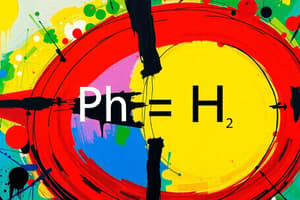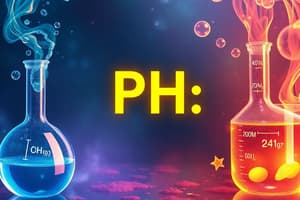Podcast
Questions and Answers
What is the characteristic shared by adenine and cytosine?
What is the characteristic shared by adenine and cytosine?
- Both are heterocyclic (correct)
- Both are acidic
- Both can form multiple non-covalent hydrogen bonds
- Both are homocyclic
What is the pH of a buffer solution where [HA] = [A-]?
What is the pH of a buffer solution where [HA] = [A-]?
- pH = 7
- pH = pKa - 1
- pH = pKa (correct)
- pH = pKa + 1
What is true about triacylglycerols and glycerophospholipids?
What is true about triacylglycerols and glycerophospholipids?
- Both contain fatty acids and are saponifiable (correct)
- Both contain fatty acids and are homocyclic
- Both contain fatty acids and are heterocyclic
- Both contain amino acids and are saponifiable
What is the assumption of the Henderson-Hasselbalch equation?
What is the assumption of the Henderson-Hasselbalch equation?
What is true about phenol and nitrophenol?
What is true about phenol and nitrophenol?
What are soaps?
What are soaps?
What is the characteristic shared by purines and pyrimidines?
What is the characteristic shared by purines and pyrimidines?
What happens to the oxidation state of a species that is being reduced?
What happens to the oxidation state of a species that is being reduced?
Which of the following is NOT a conjugate acid-base pair?
Which of the following is NOT a conjugate acid-base pair?
What is the purpose of mixing H3PO4 and NaH2PO4 in water?
What is the purpose of mixing H3PO4 and NaH2PO4 in water?
What does the buffer capacity of a solution depend on?
What does the buffer capacity of a solution depend on?
How many times more acidic is a solution with a pH of 4 compared to a solution with a pH of 7?
How many times more acidic is a solution with a pH of 4 compared to a solution with a pH of 7?
What happens when a hydrochloric acid solution is added to a solution containing equal concentrations of acetic acid and sodium acetate?
What happens when a hydrochloric acid solution is added to a solution containing equal concentrations of acetic acid and sodium acetate?
What assumption does the Henderson-Hasselbalch equation make?
What assumption does the Henderson-Hasselbalch equation make?
Which of the following statements about an acid-base buffer solution is correct?
Which of the following statements about an acid-base buffer solution is correct?
Which of the following molecules is typical of fatty acids?
Which of the following molecules is typical of fatty acids?
What is the primary function of pH measurements?
What is the primary function of pH measurements?
What is the equilibrium constant for the autoionization of water at 25°C?
What is the equilibrium constant for the autoionization of water at 25°C?
What is the condition for a neutral solution?
What is the condition for a neutral solution?
What is the relationship between pH and pOH in an aqueous solution?
What is the relationship between pH and pOH in an aqueous solution?
What is the main functional group in a fatty acid that makes it an acid?
What is the main functional group in a fatty acid that makes it an acid?
What is the type of linkage present in the disaccharide lactose?
What is the type of linkage present in the disaccharide lactose?
Why is the phenoxide ion more stable than phenol?
Why is the phenoxide ion more stable than phenol?
What is the primary characteristic of a buffer solution?
What is the primary characteristic of a buffer solution?
What is the reaction between butanoic acid and ethanol called?
What is the reaction between butanoic acid and ethanol called?
What is an example of a buffer solution?
What is an example of a buffer solution?
What is the Henderson-Hasselbalch equation used for?
What is the Henderson-Hasselbalch equation used for?
What is the main product of the reaction between a fatty acid and a base?
What is the main product of the reaction between a fatty acid and a base?
Which of the following is NOT a characteristic of a fatty acid?
Which of the following is NOT a characteristic of a fatty acid?
What is the type of reaction that breaks down a fatty acid into its components?
What is the type of reaction that breaks down a fatty acid into its components?
What is the term for the formation of a metallic salt of a fatty acid?
What is the term for the formation of a metallic salt of a fatty acid?
Which of the following lipids is NOT saponifiable?
Which of the following lipids is NOT saponifiable?
Which type of membrane lipid contains an acidic oligosaccharide?
Which type of membrane lipid contains an acidic oligosaccharide?
What is a common feature of both integral and peripheral membrane proteins?
What is a common feature of both integral and peripheral membrane proteins?
What is the result of catalytic dehydrogenation of primary alcohol?
What is the result of catalytic dehydrogenation of primary alcohol?
What is the pH at which half the amino acid molecules have a +1 charge?
What is the pH at which half the amino acid molecules have a +1 charge?
What is the product of the reaction between propanoic acid and sodium hydroxide?
What is the product of the reaction between propanoic acid and sodium hydroxide?
What is the result of oxidation of ethanol?
What is the result of oxidation of ethanol?
Which type of acid does NOT exhibit optical isomerism?
Which type of acid does NOT exhibit optical isomerism?
What is the product of the reaction between a carboxylic acid and an alcohol?
What is the product of the reaction between a carboxylic acid and an alcohol?
Flashcards are hidden until you start studying
Study Notes
Weak Bases
- A weak base is a substance that donates a pair of electrons to form a coordinate bond, but it does not fully dissociate in water.
- The structure of a weak base differs from antipyrine on the position of the C5-atom.
Henderson-Hasselbalch Equation
- The Henderson-Hasselbalch equation is used to calculate the pH of a solution.
- The equation is pH = pKa + log([A-]/[HA]), where pKa is the negative logarithm of the acid dissociation constant, [A-] is the concentration of the base, and [HA] is the concentration of the acid.
- The equation assumes that the concentration of the acid and base are equal.
pH Calculations
- The pH of a solution can be calculated using the Henderson-Hasselbalch equation.
- For example, the pH of a solution that is 0.30M in ammonia (NH3) and 0.20M in ammonium chloride (NH4Cl) can be calculated using the equation.
- The pH of a 0.2M HCl solution can also be calculated.
Characteristics of Compounds
- Adenine and cytosine are heterocyclic compounds, meaning they have atoms of different elements in their ring structure.
- Purines and pyrimidines can form multiple non-covalent hydrogen bonds.
- Soaps are water-soluble sodium or potassium salts of long-chain fatty acids.
- Triacylglycerols and glycerophospholipids contain fatty acids and are saponifiable.
- Phenol is less acidic than nitrophenol.
Buffer Solutions
- A buffer solution is a solution that resists changes in pH upon the addition of small amounts of acid or base.
- Buffer solutions usually consist of a weak acid with its conjugate base or a weak base with its conjugate acid.
- The Henderson-Hasselbalch equation can be used to calculate the pH of a buffer solution.
- The capacity of a buffer to neutralize added acid or base depends on the concentrations of HA and A- in solution.
- A buffer solution can be made by mixing H3PO4 and NaH2PO4.
Acid-Base Reactions
- The pH of a solution can be affected by the addition of acid or base.
- A solution with a pH of 3 is 1000 times more acidic than a solution with a pH of 6.
- The reaction of hydrochloric acid with a solution containing equal concentrations of acetic acid and sodium acetate results in the formation of CH3COOH.
- Aldehydes readily undergo oxidation, while ketones are resistant to mild oxidation.
Lipids
- Fatty acids are molecules that have a straight chain of an even number of carbon atoms, with hydrogen atoms along the length of the chain and a carboxyl group at one end.
- Triacylglycerols are formed by linking fatty acids with an ester linkage to three alcohol groups in glycerol.
- Saponification is the formation of a metallic salt of a fatty acid, and it involves the treatment of free fatty acids and/or glycerides with a base.
- Ganglioside is a type of membrane lipid that contains an acidic oligosaccharide.
Amino Acids
- At pH 5.5, half of the amino acid molecules have a +1 charge.
- The chemical formula of citric acid includes the groups COOH and OH.
Aldehydes and Ketones
- Secondary alcohols can be oxidized to form ketones.
- Aldehydes can be reduced to form primary alcohols.
- Catalytic dehydrogenation of primary alcohols gives an aldehyde.
Autoionization of Water
- Water can undergo autoionization to form H3O+ and OH ions.
- The equilibrium constant for the autoionization of water, Kw, is 10-14 at 25°C.
- In a neutral solution, [H3O+] = [OH-].
- In an acidic solution, [H3O+] > [OH-].
- In a basic solution, [OH-] > [H3O+].
pH Measurements
- pH can be measured using pH paper, pH meters, or quantitative measures of acidity or basicity.
- pH is a measure of the concentration of hydrogen ions in a solution.
Buffer Capacity
- The buffer capacity of a solution depends on the concentrations of HA and A- in solution.
- A buffer solution can be made by mixing H3PO4 and NaH2PO4.
- The Henderson-Hasselbalch equation can be used to calculate the pH of a buffer solution.
Other
- The structural formula of lactose includes a β-1,4-glycosidic bond.
- Ethanol can be converted to ethanal by oxidation.
- The reaction of propanoic acid and sodium hydroxide produces sodium propanoate and water.
- The products of a reaction between a carboxylic acid and an alcohol are an ester and water.
- Malic acid does not exhibit optical isomerism.
Studying That Suits You
Use AI to generate personalized quizzes and flashcards to suit your learning preferences.




